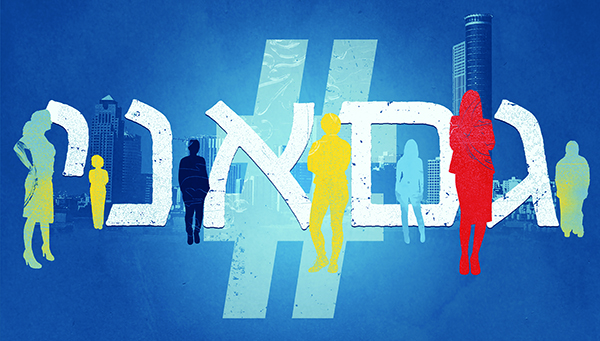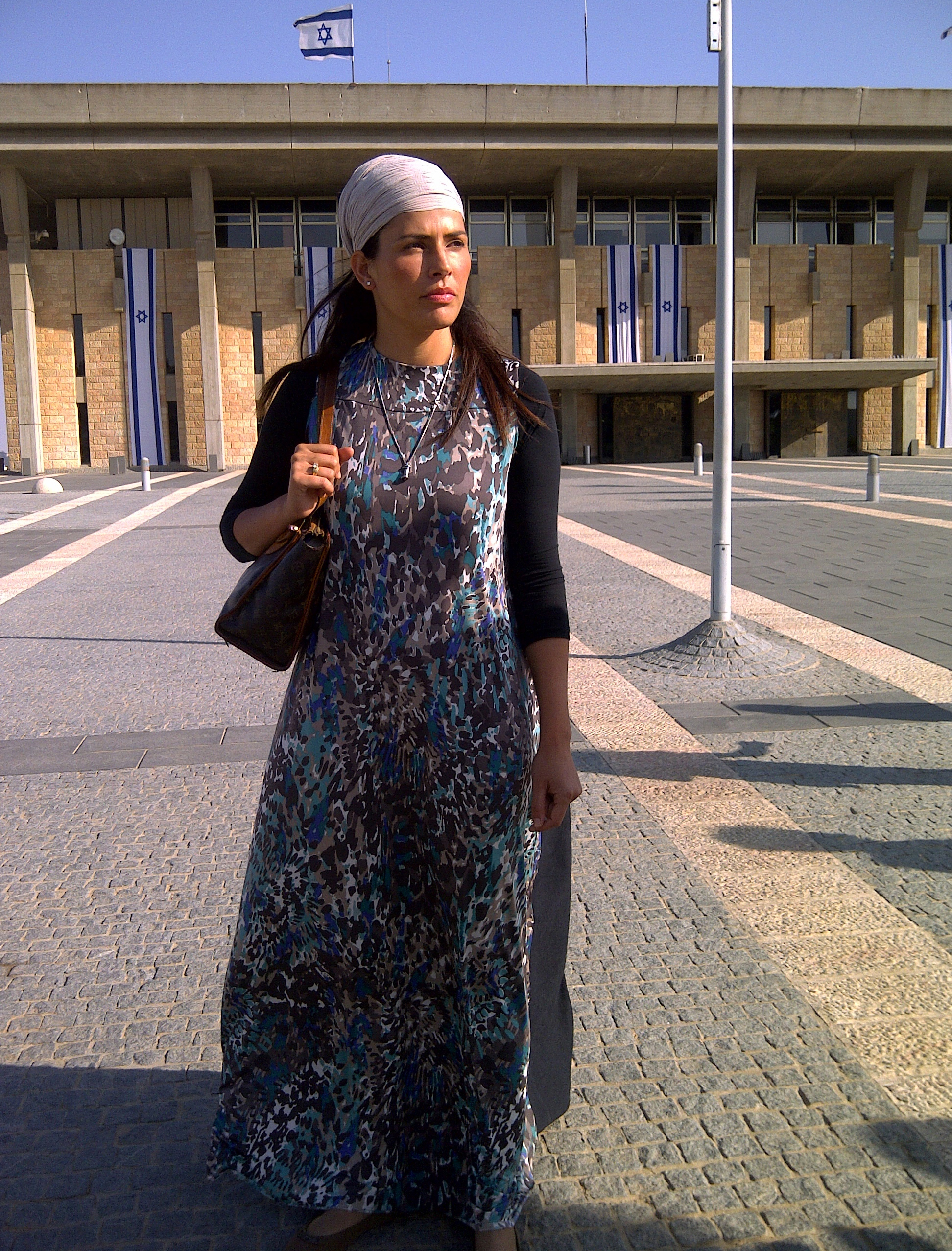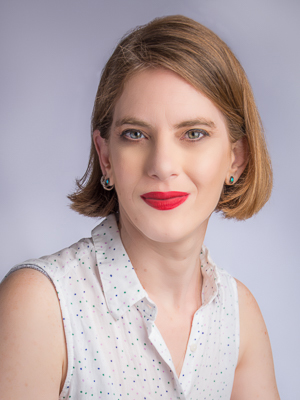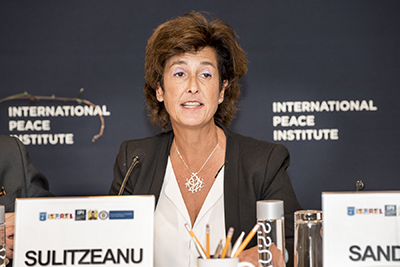Israeli Scene
#GamAni, the #MeToo Movement in Israel
In 2007, the eighth president of the State of Israel left office amid a storm of allegations of sexual abuse. Moshe Katsav had clung to his presidency, intimidating and belittling the women who accused him. In 2010, an Israeli court convicted him of rape and sexual harassment and, in 2011, imposed a seven-year jail sentence. Five years later, according to his parole board, the prisoner “denies the crimes he committed” as “though there had been no legal process,” and he had never expressed remorse. Nonetheless, parole for good behavior was granted, and he was released shortly afterward, controversially excused from serving almost a third of his sentence.
The story of Katsav, now 73, underscores two clashing mindsets toward gender-based violence and misconduct in Israel. While there is both the will and the legislation to protect the victims and pursue and punish the perpetrators, a pervasive, sexist subculture exists among men that objectifies women and discounts their experiences.

It was into this climate that the #MeToo movement burst onto Israel’s public sphere in October 2017 in the wake of startling revelations of sexual assault and harassment by high-powered individuals in the United States. As in the United States, hundreds and then thousands of Israeli women divulged stories of abuse and assault—often for the first time—on social media, many under the hashtag #GamAni, which is the Hebrew translation of #MeToo. Prominent figures were accused, including journalist Dan Margalit, radio talk show host Gabi Gazit and Keshet Media Group president Alex Gilady, all of whom denied the allegations.
Other women told of suffering at humbler hands. Rena, a Jerusalemite from a middle-class family who asked that her full name not be disclosed, was 15 when, she said, the boss at her summer job lured her into a stockroom, touched her intimately and terrified her. Her parents filed no complaint, telling her it was best for her to forget about it. She kept silent for eight years but forgot nothing. When #GamAni emerged, the anguish and outrage she poured into Facebook posts were directed as much against her parents as her abuser. “How angry I’ve been,” she wrote, “for not knowing what to do, with my body that didn’t fight, with Dad, who didn’t beat up the man who abused me, with Mom, who told me nothing had happened, better not file a complaint because it’d be ‘traumatic.’ ”
For all that the phenomenon in Israel resonates with what is happening in the United States, core differences exist. “One key distinction is that ‘#MeToo’ was in Israel for years before the online tsunami hit,” said Orit Sulitzeanu, 55, executive director of the Association of Rape Crisis Centers in Israel, which has provided a public forum for voicing stories of abuse and harassment since 1990. “Another is that sexual abuse hotbeds in Israel were institutions such as the police and army, which were already addressing the problem in legislation and programs, whereas in the United States the focus was primarily the worlds of media and politics, which were not.”
ALSO READ: “What’s Changed in the Jewish World After #MeToo?” and “When Rabbis Say #MeToo”
Nevertheless, the new openness that the movement brought to Israel has bolstered the struggle to bring these abuses to light, reaching thousands of victims who had felt alone until #MeToo showed them that they were not, according to Elah Alkalay, chair of the Israel Women’s Network, which works to advance the status of women in Israel and is a Hadassah Foundation grantee. Israel’s assault hotlines have recorded steep upticks in calls. The Association of Rape Crisis Centers’ helpline, for example, saw an 11 percent spike over its annual 47,000 calls after #MeToo went viral.

“There’s always a surge when abuse hits the headlines—from Moshe Katsav to [now United States Supreme Court Justice] Brett Kavanaugh—but #MeToo’s impact has been especially intense,” said helpline volunteer Debbie Rosenblit. “I took a call from a deeply distressed woman whose 24-year-old daughter had confided being molested as a teen—a confession that unwittingly exploded a landmine.” The caller, too, had been sexually assaulted as a youngster, “and was finally ready to tell her story.”
While #MeToo has shaken the world, some Israeli women have long been proactive against sexual misconduct. A possibly apocryphal story places Golda Meir among them. When the former prime minister’s cabinet proposed an after-dark curfew to protect women from nighttime assault, she supposedly retorted: “It’s the men who attack. If there’s a curfew, let the men stay home!”
Long after that never-implemented curfew of the early 1970s and well before social media midwifed #MeToo, Israeli beauty queen Linor Abargil galvanized women in Israel. In 1998, the then-18-year-old Miss Israel was choked, bound and raped by a travel agent named Uri Shlomo Nur. Her mother urged her to go straight to the police, unshowered; her rapist got 16 years in jail. Abargil was crowned Miss World six weeks after the rape and, a decade later, launched a global crusade for sexual abuse victims. Her website, bravemissworld.com, features stories from those who have been assaulted, and the Emmy-nominated documentary chronicling her story, Brave Miss World—directed by Cecilia Peck, daughter of actor Gregory Peck—has been screened on hundreds of college campuses and other venues worldwide.
Yael Sherer likewise became an early force in publicly combating sexual harassment and abuse in Israel. Born in 1982 into an academic family in the upscale suburb of Kochav Yair in central Israel, she was a “Daddy’s girl,” she said, unaware until age 13 that what was happening between her and her father was sexual assault, and illegal. She turned to a cousin, a teacher and then a social worker, all of whom implied she had better keep quiet. Her emotional state deteriorated and, at 17, she was admitted to a psychiatric hospital. The police eventually investigated, and her father was convicted and served two years of a three-year sentence. In 2007, Sherer sued him in civil court, an experience she chronicled in the documentary Dirty Laundry. “What happened to me is happening to others,” she told the Haaretz daily after the documentary was shown in 2012 on Israel’s Channel 2. “As a child, it never occurred to me I wasn’t alone, wasn’t guilty and could fight and win.”
Sherer, who at 19 shocked the court at her father’s criminal hearing by taking the stand rather than submitting a written deposition, speaks directly to the camera in Dirty Laundry. “I wasn’t going to be the shadowy cliché, filmed from behind, which is how abuse victims are usually shown,” she said in an interview with Hadassah Magazine. “I’m a whole person.”
In 2013, Sherer, along with activist Shlomit Havron and attorney and rape survivor Gal Shargill, created the Facebook page Achat Mitoch Achat (One of One), so named because “every woman has a story,” Sherer said. “It was #MeToo four years before #MeToo, a platform where women and men with names and faces share their stories of sexual harassment, abuse, incest and rape.” After the emergence of the worldwide phenomenon, Achat Mitoch Achat’s 10 to 20 weekly posts doubled. Today, the page carries over 2,500 sexual abuse testimonies, and Achat Mitoch Achat has developed into an organization that provides legal and other help to victims, promotes new legislation and lobbies for implementation of existing laws. It also maintains a database of individuals with complaints filed against them, which has helped police identify multiple offenders.

“We were pioneers,” said Sherer, today 36 and a documentary filmmaker and journalist. “We’ve brought about tangible social change. Language is more respectful of abused women, the media are less judgmental, action is underway in the workplace and Israel’s government recognizes there’s a problem.”
Officially, Israeli law has zero tolerance for sexual harassment and abuse. Existing legislation and public opinion toppled not only a sexually abusive president, but also government ministers Silvan Shalom and Yinon Magal, who were the subject of abuse allegations in 2015. In addition, in the past two decades, senior Israel Defense Forces officers Maj. Gen. Yitzhak Mordechai and Brig. Gen. Ofek Buchris were criminally accused and convicted of abuse.
Punishment, however, often fails to reflect the gravity of the crime. “When the maximum penalty for rape is 16 years, and a one-year sentence is imposed, the people upstairs aren’t doing their job,” said Sherer.
As in many countries, Israel fights a fundamental inconsistency: Awareness, activism and legal redress for abuse are not always reflected in cultural norms. Many still see harassment and even assault as minimally reprehensible, nod-and-wink offenses. Within Israel’s cultural mosaic exist sternly patriarchal societies. Added to this mix are Israel’s immigrant populations, where tensions and stress can explode in sexual abuse; and its hierarchical army—which annually conscripts some 60,000 18-year-olds—where abuse of power can translate into assault and harassment, according to experts.
Despite or perhaps because of this cultural tangle, Israel is at the forefront of social initiatives, said Sulitzeanu, the director of the Association of Rape Crisis Centers. Rape, including marital rape, has been a felony since the state’s early years. The Law Against Sexual Harassment—enacted in 1998 and still one of the world’s most progressive, according to Sulitzeanu—criminalized sexual assault and prohibited verbal harassment as “discriminatory practice, restriction of liberty, offense to human dignity, violation of every person’s right to elementary respect and infringement of the right to privacy.” When it was passed, men, including those in powerful positions, were heard to grumble that feminists were “taking all the fun out of relationships,” said legal scholar and lawyer Orit Kamir, who was among those who drafted the law.
While this legislation has brought down powerful abusers, said Sulitzeanu, “its teeth are often blunted by denial, minimizing the crime and entrenched attitudes: ‘Women exaggerate! It was just a joke! Can’t I give a colleague a hug?’ ”
In 2017, Israel became a world leader in efforts to counter workplace harassment when it cosponsored the United Nations Resolution for Preventing & Eliminating Sexual Harassment in the Workplace. The following year, Sulitzeanu presented to the United Nations Israel’s precedent-setting voluntary code of ethics to combat sexual harassment in the workplace, developed by the Association of Rape Crisis Centers and the Standards Institution of Israel with partial funding by the Hadassah Foundation.
“Unlawful and harmful sexual- or gender-based harassment are found in every industry, impacting economic productivity and employment,” said Stephanie Blumenkranz, recently appointed director of the Hadassah Foundation, established by Hadassah, the Women’s Zionist Organization of America, in 1998 to invest in social change organizations that empower girls and women in Israel and the United States. “The average annual GDP loss for damage to one woman is $3,780. A fifth of women harassed reported a decline in labor productivity, and 9 percent stopped working altogether. The code helps employers establish appropriate workplace policies.”

It also gives those harassed a third avenue for redress: an employer-appointed ombudsman. “The police need evidence, and civil suits are costly,” Sulitzeanu said of the other avenues. “The code recommends appointing ombudsmen in every workplace with over 25 employees—and city councils, health insurance funds, banks and more are doing so.” It is still a work in progress, she noted. “Sexual exploitation between, say, a dentist and patient manifests differently than between a sports coach and young athlete, and must be addressed differently. But change is coming.”
The pace of change can, however, be glacial. In the IDF, an internal study in 2017 found that one in six female soldiers reported having been sexually harassed. Although reporting of sexual offenses in the military—from verbal abuse and stalking to violence and assault—has risen by 80 percent in the past 15 years, the formal complaint is only the start of a lengthy process for victims. Yael, an 18-year-old who declined to give her full name, is one of them. “I told my officer that his second-in-command assaulted me,” she recounted. “He said he’d take care of it, but they were friends so I knew nothing would happen. The girls serving with me urged me to go to the IDF’s Women’s Affairs Advisor. She said prosecution would be a hard road, but she’d be with me every step. It took a year. They demoted him, gave him two months of grunt work and a $400 fine—nothing compared with what he did to me. For a long time, I regretted reporting him, but, looking back, I know it was important. It helps things change.”
Change is also underway in Israel’s closed ultra-Orthodox world. The so-called walls of sanctity—a term used to convey the segregation by choice of Israel’s one-million-plus haredim from mainstream society—have become a little more porous. Rabbis who once addressed problems privately are increasingly willing to cooperate with the authorities on sexual abuse and assault-related issues. Sixteen male and female investigators, familiar with the haredi world, are employed countrywide by the Israeli police to investigate and address claims. This new openness, however, coexists with old attitudes. Allegations have recently surfaced that ultra-Orthodox Deputy Health Minister Yaakov Litzman continues to pressure corrections officials for special privileges for at least 10 haredi sex offenders. Litzman is currently under police investigation, though he denies any wrongdoing.
Sexual abuse is a particularly sensitive problem in the community, said haredi attorney Rebecca Shwartz, “but there’s heightened awareness of it among the haredi public”—something Shwartz herself has helped spearhead. In 2013, she created Min Hameitzar (From the Depths), an organization that gives ultra-Orthodox sexual abuse victims support and legal assistance. The haredi digital media now discuss the issue, albeit discreetly—using terms like “offense” in an assault case but never, for example, “sexual offense.” There is a closed 17,000-member Facebook group, Some Girls and What’s Between Them, that addresses these issues directly; and dedicated helplines for the ultra-Orthodox at the Association of Rape Crisis Centers as well as at the Israel Women’s Network’s Hotline for Women in the Workforce.
Every voice makes a difference, according to Abargil, the former Miss Israel and Miss World who today is a lawyer and a religiously observant mother of three. The impact of hundreds of thousands of voices around the world unlocked through #MeToo is helping drive a vast cultural shift in Israel.
Wendy Elliman is a British-born science writer who has lived in Israel for more than four decades.
ALSO READ: “What’s Changed in the Jewish World After #MeToo?” and “When Rabbis Say #MeToo”










 Facebook
Facebook Instagram
Instagram Twitter
Twitter
[…] ALSO READ: “What’s Changed in the Jewish World After #MeToo?” and “#GamAni: The #MeToo’s Impact in Israel” […]